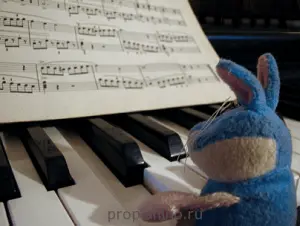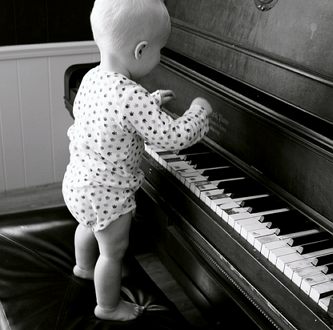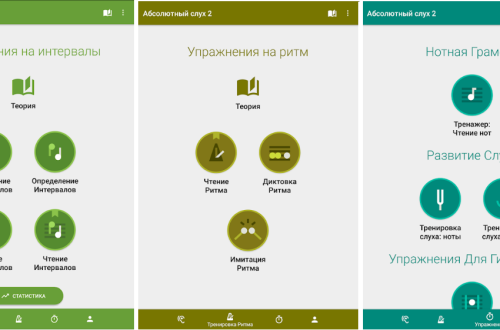
Learning to Play the Piano (Introduction)
Contents
 So the moment has come when you have a piano in front of you, you sit down at it for the first time and … Damn it, but where is the music ?!
So the moment has come when you have a piano in front of you, you sit down at it for the first time and … Damn it, but where is the music ?!
If you thought that learning to play the piano would be easy, then acquiring such a noble instrument was a bad idea from the very beginning.
Since you are going to make music, even if it is only a hobby for you, then immediately set yourself a goal that you will be ready for at least 15 minutes, but every (!) Day to devote your time to playing the instrument, and only then will you get the results for which, in fact, you are reading this text at all.
Have you thought? If you initially have no desire to learn to play the piano, then is it worth choosing this kind of activity at all? If you have firmly decided that music is definitely a significant part of your life, and you are ready to make certain sacrifices for it, then you are on the right track!
The content of the article
- How to learn to play the piano?
- Do I need to know solfeggio to play the piano?
- Is it possible to learn to play the piano without an ear for music?
- First theory, then practice
- Is it possible to quickly learn to play the piano?
How to learn to play the piano?
Let’s immediately discuss one rather interesting dispute that has been going on for a long time between musicians, most of them from the XNUMXth-XNUMXst centuries.
Do I need to know solfeggio to play the piano?
Do musicians need knowledge of solfeggio, or, on the contrary, does it enclose a creative person in certain meaningless frames?
Undoubtedly, there are people who, without education, without any knowledge of music, were able to achieve wide popularity, success, were able to compose decent music (the legendary The Beatles are the clearest example). However, you should not be equal to that time, in many ways such people achieved fame, being children of their time, and besides, remember the same Lennon – not a very enviable fate in the end, you will agree with me.
An example, to be frank, is not very successful – in playing the piano, great depth was initially laid down. This is an academic, serious instrument, and simpler instruments originated from folk music, which also implied simpler motives.
Is it possible to learn to play the piano without an ear for music?
Another extremely important clarification. I think that you have heard more than once about such a concept as “ear of music”. One hundred percent hearing from birth is a phenomenon as exceptional as the fall of meteorites to Earth. In fact, it is just as rare for people to have its complete absence. All this I lead to the fact that NEVER listen to those who say that without hearing, without playing music from childhood, there is no point in trying to do anything at all. And I have heard this from many truly established musicians.
Think of hearing as an abstract muscle. When you go to the gym, your muscles grow; when you study the exact sciences, the speed of your counting in your mind increases, no matter what you do – as a result, any person, both at the biological and at the mental level, will progress. Rumor is no exception. Moreover, regardless of your initial data, with due diligence, you can surpass those who, it would seem, have more experience than you.
Another nice feature of any creativity is that even with different levels of skill, not necessarily the one who knows more (for example: he knows how to play at great speed) will compose works more interesting than his not so straightforward colleagues.

Everything is simple. We are all individual, and creativity is the transfer of a piece of our own soul, mind to others who delve into other people’s works. People who are closer to your position in life, the style of your compositions, will appreciate you more than a pianist who is just a technical performer.
Studying musical notation will help you not only understand the very structure of music, but will help you easily and quickly record works by ear, will allow you to easily improvise, compose.
Learning to play the piano should not be an end in itself – the goal should be the desire to play music. And, when you learn all the subtleties of scales, modes and rhythms, then, believe me, it will be much easier for you to master any instrument than for a person who has never played anything in his life. So anyone can learn to play the piano, if only there is a desire.
I want to debunk another myth. Often, in order to determine the degree of development of hearing, they are asked to sing some famous song. Some people can’t sing “A Christmas tree was born in the forest.” Usually, any desire to learn is deeply hidden on this, envy of all musicians appears, and later there still appears an unpleasant feeling that no attempt was made to learn how to play the piano in vain.
In fact, everything is far from being so simple. Hearing is of two types: “internal” and “external”. “Internal” hearing is the ability to imagine musical images in your head, to perceive sounds: it is this hearing that helps to play instruments. It is certainly connected with the external, but if you could not sing something, this does not mean that you are initially good for nothing. Moreover, I’ll tell you, there are talented musicians: guitarists, bassists, saxophonists, the list goes on for a long time, who improvise perfectly, are able to pick up complex melodies by ear, but they can’t sing anything!
The solfeggio training complex includes singing, drawing out notes. With self-study, this will be quite difficult – you need a person with sufficient experience and hearing who can control you. But in order to help you learn to read music from a sheet, to give you the knowledge that will help you in improvisation, only your own interest is important.
First theory, then practice
Remember: those who immediately begin to practice, not knowing the theory, become parents early … Sorry for the rude joke, but there is definitely a lot of sense in this – thoughtlessly sitting and poking fingers at the piano keys will slow down your progress in mastering the instrument very, very much .

The piano seems to be a very simple instrument at first glance. Ideal construction of the order of notes, simple sound production (you don’t have to wear your fingertips to calluses when you clamp the strings). It may indeed be quite simple to repeat simple melodies, but in order to replay the classics, to improvise, you will have to seriously learn.
I may be repeating myself, but it’s important to realize that learning to play the piano can take over a year. But, the best advice is to imagine the result, yourself in a few years, and it will be much easier and more interesting for you.
Is it possible to quickly learn to play the piano?
Theoretically, everything is possible, but once again I remind you of one of the most important theses: classes for 15 minutes, but every day will be a hundred times more effective than 2-3 times a week for 3 hours. By the way, information that is stored in a short time period is absorbed most effectively.
Try to eat all the food that you share for breakfast, lunch and dinner at one time. Excess is harmful not only for the stomach!
So are you ready? Then… Then straighten your back and move the seat closer to the piano. What do you want? Theater also begins with a hanger!




